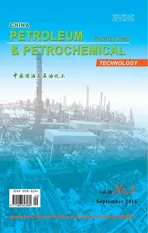First DCC-plus Unit Comes Online Successfully at IRPC in Thailand
2016-02-04
First DCC-plus Unit Comes Online Successfully at IRPC in Thailand
The SINOPEC’s Research Institute of Petroleum Processing (RIPP) on the basis of its proprietary DCC technology has increased the propylene output through enhancing the propylene formation reaction and reducing the dry gas and coke yield, resulting in the development of a reinforced version of DCC process, viz.: the DCC-plus technology. This technology has been used in commercial scale at CNOOC’s Dongfang Petrochemical Company and CNOOC’s Daxie Petrochemical Company. In the meantime, this technology has been also licensed to the overseas enterprises. On March 20, 2016 the frst overseas 1.5 Mt/a DCC-plus unit was successfully put on stream at IRPC in Thailand, which is another example of successful licence of China’s petroleum processing technology with independent intellectual property rights to the foreign company following the frst licensing of DCC technology by RIPP to the TPI Company of Thailand (renamed currently as IRPC) in the 1990’s. Till March 24, 2016 the major products delivered by this DCC-plus unit have met all quality standards to pull off a great coup in the start-up of this unit.
In 2011 IRPC of Thailand made a decision to invest 1.2 billion USD in the construction of a UHV project (upstream project for hygiene and value added products) in an attempt to further utilize heavy oil for manufacturing propylene (predominantly at least 230 kt/a polymerization-grade propylene products), ethylene and aromatic chemical feedstocks, while making the invitation for bid to relevant companies in the world. RIPP, the institution that has developed the new DCC-plus technology (licensed through Technip Stone & Webster as the agent of RIPP) has won the bid for the construction of an 1.50 Mt/a unit for producing propylene from heavy oil. This 1.50 Mt/a DCC-plus unit uses the liquid products (including all the naphtha, gasoil and heavy oil fractions) from the residuum hydrodesulfurization (ARDS) process and the outside sourced olefin-rich C4fraction (accounting for 10.73% of total fresh feed) as the feedstocks in combination with the appropriate catalyst can reach at least an ethylene and propylene yield of 4.86% and 20.18%, respectively, while greatly suppressing the light ends and coke yields. Meanwhile, the aromatics-rich naphtha can serve as the feedstock for the downstream aromatics extraction unit to manufacture benzene, toluene and xylene. Hence, the DCC-plus unit is a core operating unit for refning-chemical integration in the whole UHV project, which can provide a feasible and economic technical route for utilizing heavy oils to produce chemical feedstocks.
杂志排行
中国炼油与石油化工的其它文章
- Innovative Recycle-free Methanation Process for Manufacture of Gas from Coal
- Commissioning of 100 kt/a Project for Manufacture of Aromatics from Methanol at Shaanxi Baoji Nitrogen Chemicals Group
- PetroChina’s Aldehyde Hydrotreating Catalyst Has Been for the First Time Applied at SINOPEC’s Qilu Petrochemical Company
- Largest in China Methanol Project with Coproduction of LNG Comes on Stream in Xiaoyi
- China’s Novel Propane/Butane Dehydrogenation Technology Successfully Tested in Commercial Scale
- Bifunctional Catalyst Capable of Directly Converting Syn-gas to Lower Olefins
